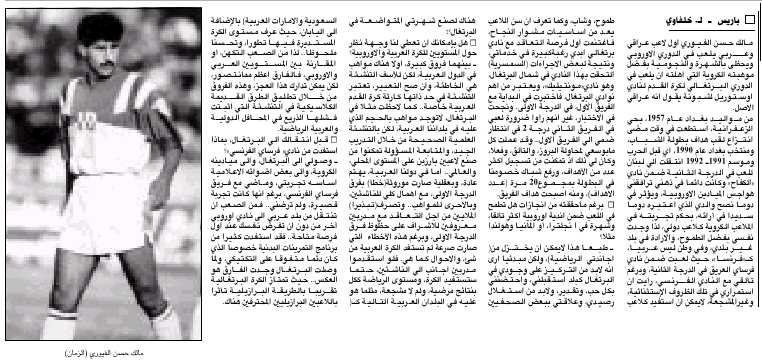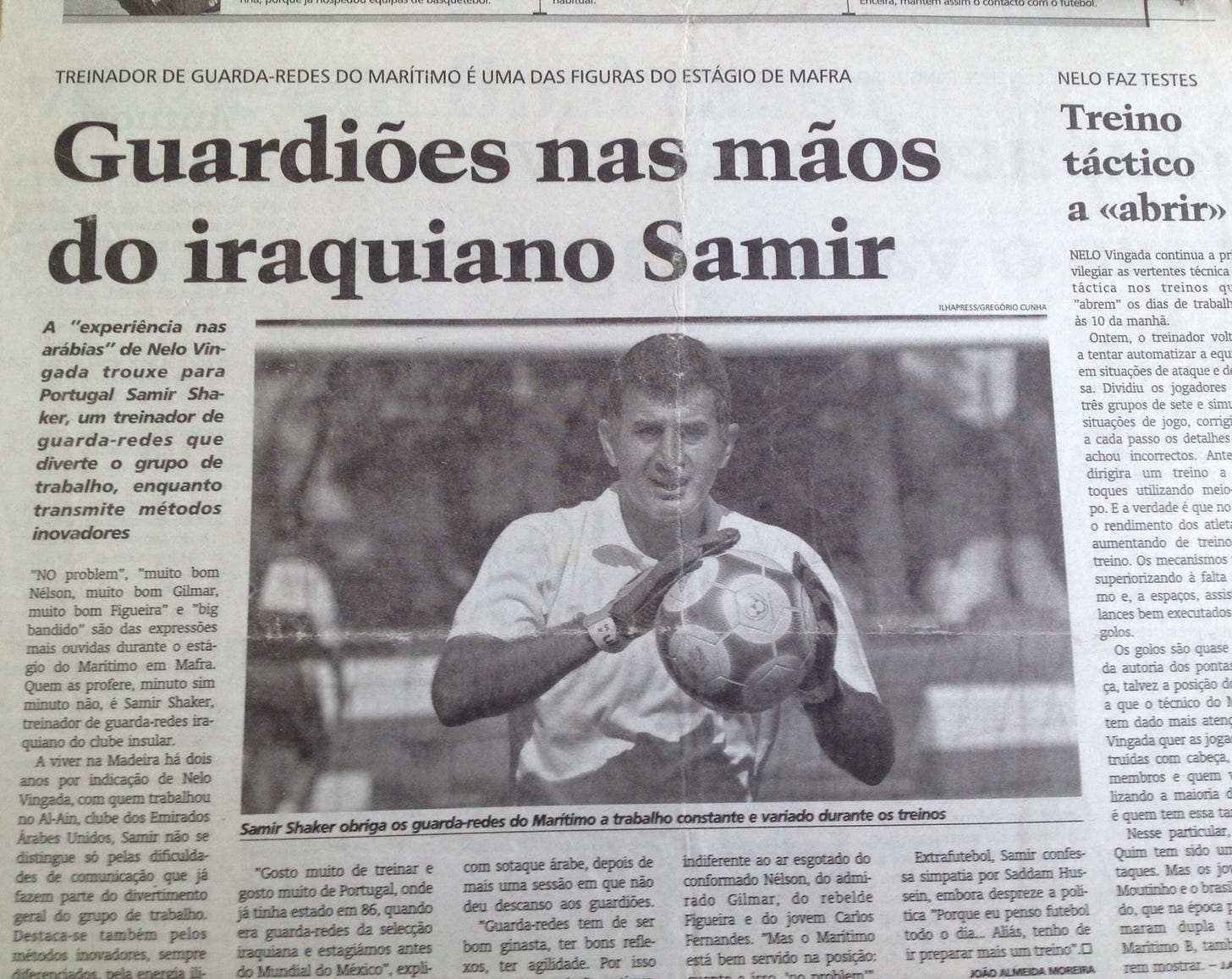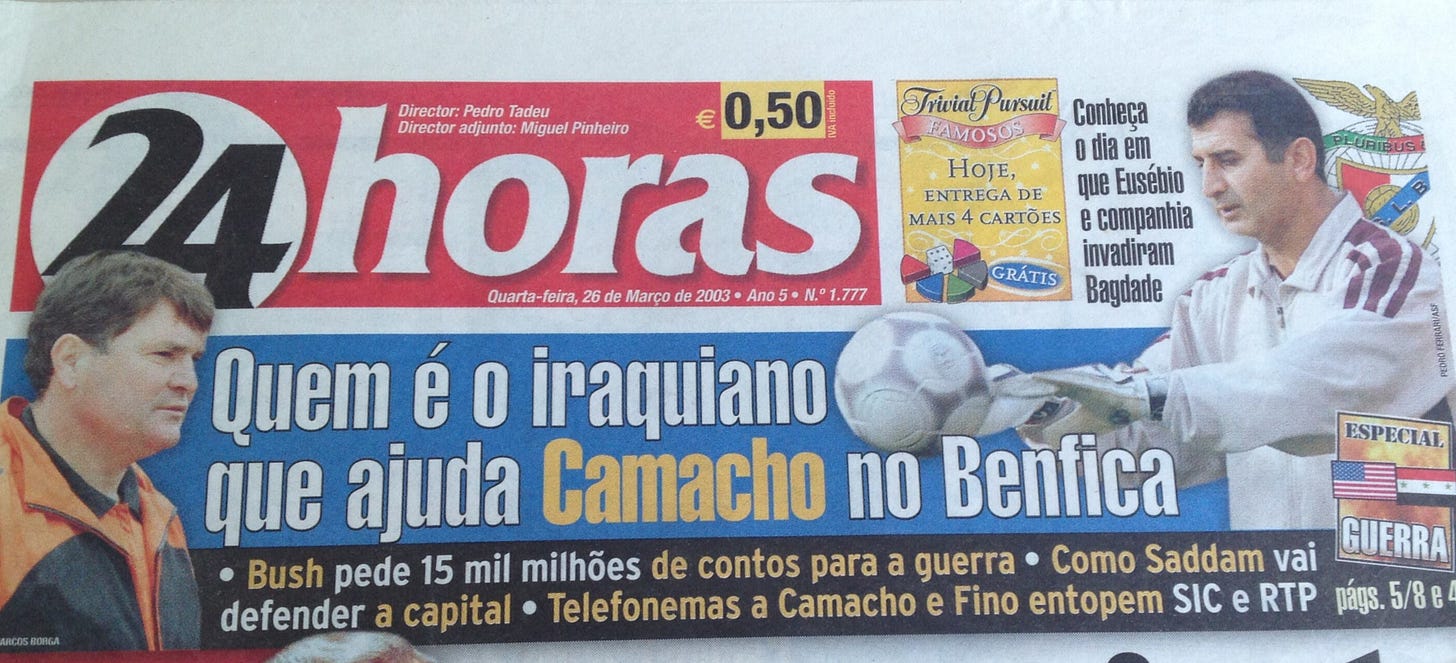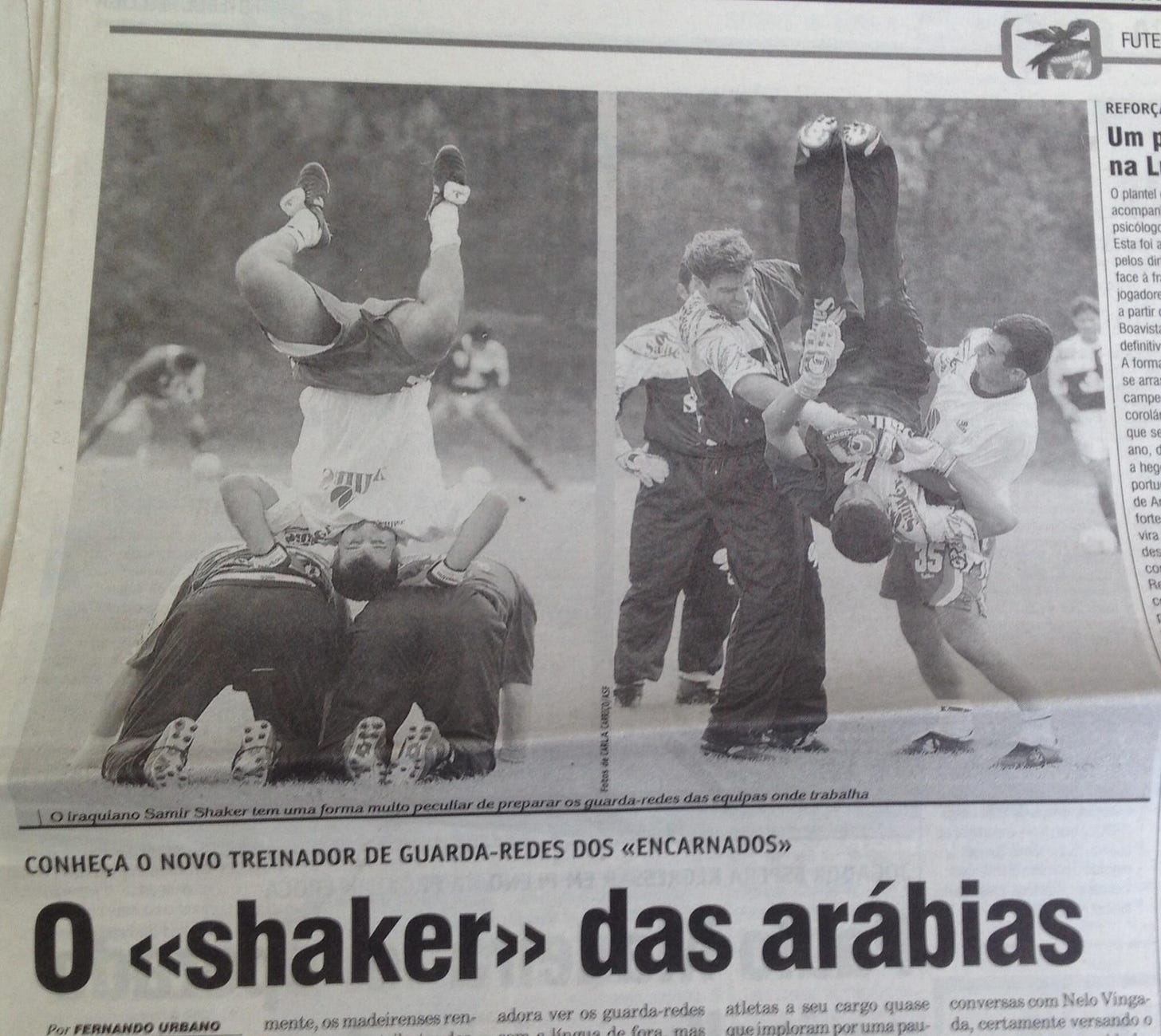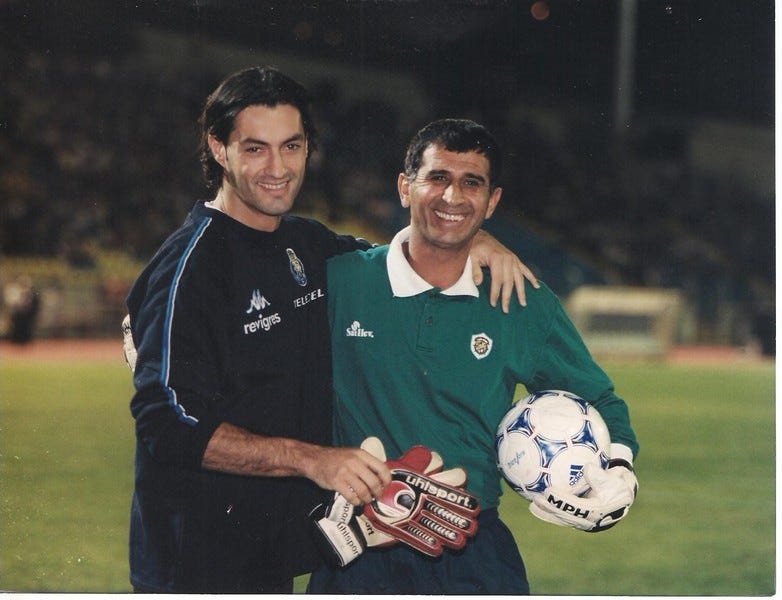A Tale of Two Iraqis in Portugal
The Portuguese adventures of Samir Abdul-Ridha and Malik Hassan Karim
In the late 1990s, two Iraqis arrived in Portugal, one a player and the other a goalkeeping coach. They were the first Iraqis in the history of Portuguese football, which had brought the world, stars such as Eusébio, Luis Figo and Rui Costa.
Iraqi striker Malik Hassan Karim came to Portugal for a trial with Primeira Liga club GD Chaves. There he spent three days, though according to the forward, “They did not want me.” However, he remained in Portugal instead of returning to France, where he had been playing for FC Versailles in the lower amateur divisions and joined CDC Montalegre in III Divisão, the Portuguese fourth tier.
Malik was the son of footballer Hassan ‘Fury’ Karim who had played for Baghdad’s Haris Al-Maliki and Al-Quwa Al-Jawiya in the Fifties and had been a renowned youth coach in local football.
Iraqi striker Malik Fury
Born in Baghdad on May 5, 1971, Malik came from the working-class neighbourhood of Al-Zafraniya, where he managed to win the leading scorer title of the youth championship for the Baghdad XI before the Gulf War. He began with the youth team at the Amana Club and later played for Al-Quwa Al-Jawiya and Al-Salam, where he was a regular.
In season 1993-1994, he moved to Lebanon from his father’s urging because of the political climate in the country with his elder brother having links to a political opposition party and first played for Shekka Club and later for La Sagesse, where he scored 11 goals during the 1994-1995 season but he always wanted more from the game. His aim, which always occupied his mind, was his obsession of playing in Europe.
He bought himself a plane ticket to Abidjan via Paris however as he landed at Roissy Airport in Paris, he tore up his passport and applied for political asylum in France. His new papers made him four years younger and the opportunity of a new life, but at a trial at French league champions AJ Auxerre the evergreen Guy Roux told him he was “too old”.
The Iraqi found himself at FC Versailles 78 in the Division d’Honneur where Thierry Henry had started his career only a few years earlier.
He started to crave-out a career with the French club, but after a while, he could not carry on with the bad period at the club at that time and believed a different stage could benefit his footballing ambitions. At the age of 23-years of age holding a French passport, being young and knowing that a players age was important to succeed, he grabbed the first chance to sign for the Portuguese club which he desired so much in his whole life.
As a result of some of the connections of his agent, Malik joined a club in the north of Portugal, which was CDC Montalegre. He succeeded in a trial, showing the necessity in playing for the club’s second team, he was chosen to play for the first team. And he tried to improve himself to become a better player and he started to score goals, lifting the club in the championship and netting a total of 20 goals, including three goals in one game during the month of Ramadan; he became the team’s best forward and received interest from several top teams in Portugal.
One coach who was impressed with the Iraqi forward was Rui Águas, a former star of Benfica and Portugal, then the coach of Estoril in the second division. Malik was quickly signed up by Águas.
The club had also bought several other players in the summer of 1999 including Brazilian striker Paulo Sérgio from French team Grenoble. Estoril situated in the South West of the country was the club where Portuguese striker Pauleta started his career before being signed by Salamanca in Spain and later Paris Saint-Germain in France.
Everything started well for Malik, as he adapted to his new team, “I want to help the club to go up in the division,” said the Iraqi player at the time and did not conceal that he desired to reach the top division, preferably with Estoril.
“I cannot go back to Iraq,“ Malik told Portuguese newspaper Record in 1999, after being asked if he would play for the Iraqi national team. “Due to the political situation, I would not be able to go there and come back to Europe, but I expect to return one day.”
Samir Shaker at Benfica
At the same time, Malik was finding his feet in Estoril, a 42-year-old Iraqi goalkeeping coach was landing in the city of Marítimo to begin his job at first division club Marítimo.
His name was Samir Abdul-Ridha, a former Salah Al-Deen and Iraqi international of the 80s. He had arrived in Portugal on the recommendation of Marítimo coach Nelo Vingada, after working with the Iraqi coach at Al-Ain Club in the United Arab Emirates. He had played for the Iraqi national team in the eighties, in several competitions in the Gulf and Asia for Iraq, mainly as a reserve. After he retired, he went into coaching, winning titles in Iraq, Jordan and the Emirates.
“I am honoured by the invitation of Prof. Nelo Vingada and accepted it,” the Iraqi stated on his arrival in Portugal. “While he was at Al-Ain, he carried out great work. I think that I had much luck since now and face the proposal that was made to me; I preferred to opt for Marítimo, refusing another offer from Qatar”.
It was the Iraqi coach’s first experience outside the Middle East and claimed he gave luck to whatever team he joined.
“I also expect to bring luck for my new team,” the Iraqi said, as he was greeted by Vingada at Portela Airport, adding that he knew little about Portuguese football but did possess some references of its characteristics after observing several matches of the Portuguese national team.
At Marítimo, Samir replaced goalkeeping Brazilian coach Ewerton who had returned to his native homeland after more than 10 years at the club and Vingada was adamant that he had found the right replacement.
"Quality does not have a nationality,” said Vingada, as he began explaining why he had appointed an Iraqi as a goalkeeping coach, “Dependably, there are good coaches that exist in Portugal, but when the question of a replacement came up from the exit of Ewerton, we wanted to plug the gap with someone with the same quality and that we already knew.”
On Samir Abdul-Ridha or Samir Shaker, as he was known in Portugal, Vingada stated “He is an individual with many qualities, what a person wants from a coach. He will bring innovation to the work and will give certainly give sequence to that comes being done.”
“The people will soon see the reasons for our choice," assured the trainer, who had managed Portugal’s youth team and national team and Benfica.
Samir coached goalkeepers Yves van der Straeten from Belgium, Angolan Augusto Nélson and young Portuguese keeper Marco Moura in his first season.
“All of them have a lot of quality. Yves is very good, Nélson is not that far behind - both intrepid, dependable with great values and with excellent results - and Moura, by his age, shows a big margin of progression," the Iraqi coach said he summarised his goalkeepers.
However, briefly, "The important thing is that they continue to work always from the same form, to continue to improve and contrast whenever they are called into the team," Samir Shaker concluded.
"It has been a very interesting experience. With the help of Mr Vingada and the remaining coaching staff, the president and from the structure of the club, things became easier. They helped integrate me and it develop my work with the desired efficacy" he stated, on his first few months at the club.
However, while he fitted in at his new club, his family and his two sons, one who was 11 and the other who was 12, had a few difficulties. "The biggest problem for both of them is the Portuguese language, that they have made an effort to learn," Samir confessed when he first came to the country.
Nelo Vingada commented on the Iraqi coach, "He had worked with me in the Emirates. As he analyses the capacities well, I did not have doubts about designating him to train. To replace Ewerton, a great trainer, there had to come to another trainer of the same level. If it could not be, obviously that we would have thought of another solution, but I am happy it materialised".
The Marítimo coach noted "his work is identical everywhere," and stated: "Honestly, I find that Samir is a professional who brought a more-qualitative value to Portuguese football. It is a fascinating experience for Samir. Although he is a person who has already played in World Cup qualifiers and Olympic Games, besides having travelled immensely, living in a different culture and society.”
At the end of the season, Samir’s Marítimo had finished sixth in the Portuguese Primeira Liga but the adventure of the other Iraqi Malik was coming to an end. After the coach of Estoril, Rui Águas had left the club to join top division side Vitória Setúbal in mid-season, the striker’s chances became limited as the new coach Pedro Rodrigues left him on the bench and little playing time.
Malik leaves Estoril
After finishing the season with only four goals, Malik returned to France to play in the French lower divisions with Le Chesnay’ 78.
He later had trials with Erzurumspor in Turkey and also in Iran with Pirouzi and could have played in the 2003 Asian Champions’ League against Talaba in March 2003 in Tashkent for the Iranian side!
He arrived in Tehran after receiving international clearance and on the first day of training had impressed observers and looked set to sign for the club, but the next day he failed to impress Pirouzi coach Ali Parvin and Malik returned to France.
The usual working methods of the Iraqi goalkeeping coach
In Samir’s second season, two new keepers arrived at the club to replace Yves van der Straeten and Marco Moura, one was Brazilian keeper Gilmar from Caxias do Sul and the other was Antonio Filgueira.
The Brazilian saw no problems in adapting to the new methods of the Iraqi coach. “Each has a way of working. It happens that this is with him, but I do not see a problem, therefore it converses we understand each other,” adding that he received information on the work of the Iraqi from Ewerton, who Samir replaced.
“Comparatively to that is done in Brazil, this work is done more with the ball, but it is a question of me adjusting to it,” the Brazilian Gilmar added.
In the summer of 2001, Lisbon-based giants Benfica became interested in the Iraqi coach, Vingada praised his friend, “What I am able to tell you is that Samir is a great goalkeeping coach, the best one who I have worked with. He is a fantastic professional.”
Samir eventually joined the coaching staff of Portuguese giants Benfica replacing Walter Junghans after the club had agreed to a deal which took Benfica's Brazilian striker Andre on a one-year loan deal to Marítimo. At Benfica, he joined former Portuguese national coach António Oliveira and his assistant Jesualdo Ferreira at Estádio da Luz or the Stadium of Light.
The fallen European Cup holders had strengthened their squad during the summer, bringing in the likes of Emmanuelle Pesaresi from Italian club Sampdoria, Júlio César from Real Madrid, Angolan striker Pedro Mantorras of Deportivo Alaves, Simão Sabrosa from Barcelona and Zlatko Zahovic of Spanish Champions League finalists Valencia, in a bid to challenge rivals Sporting Lisbon and FC Porto in the league.
Samir imposed his very peculiar style in daily training sessions with Benfica’s goalkeepers. Some of their activities were by their own aspects acrobatic, which some Portuguese newspapers noted: “would not look far removed from a spectacle in a circus.”
He also filmed the movements of the goalkeepers who included the late German Robert Enke, José Filipe Moreira and Paulo Lopes, placing a small camera behind the goal in the intention of registering the positions of the keepers in different situations in a game, with the aim of correcting the aspects of their game.
He always gave encouragement to his goalkeepers, and in every training session, you could hear Samir shouting "Muito bem" (very good) to his players.
"I am satisfied with the Samir,” the late German goalkeeper Enke once stated. “He has other approaches, but I like to work with him. And I think that it is also the opinion of the other goalkeepers in the team."
The club finished in fourth place in 2001/2002 and the following season, the club signed goalkeepers Carlos Bossio of Argentina and Nuno Santos, who helped the club to second place.
In the summer of 2003, after new Spanish coach José Antonio Camacho decided not to keep the Iraqi on his coaching staff, Samir left Portugal after four years in Europe ending Iraq’s association with Portuguese football.
Today, Iraq has a player in the Primeira Liga, with Santa Clara’s star midfielder Osama Rashid being one of the league’s top players, a sign of progress of the Iraqi game in Portugal.




